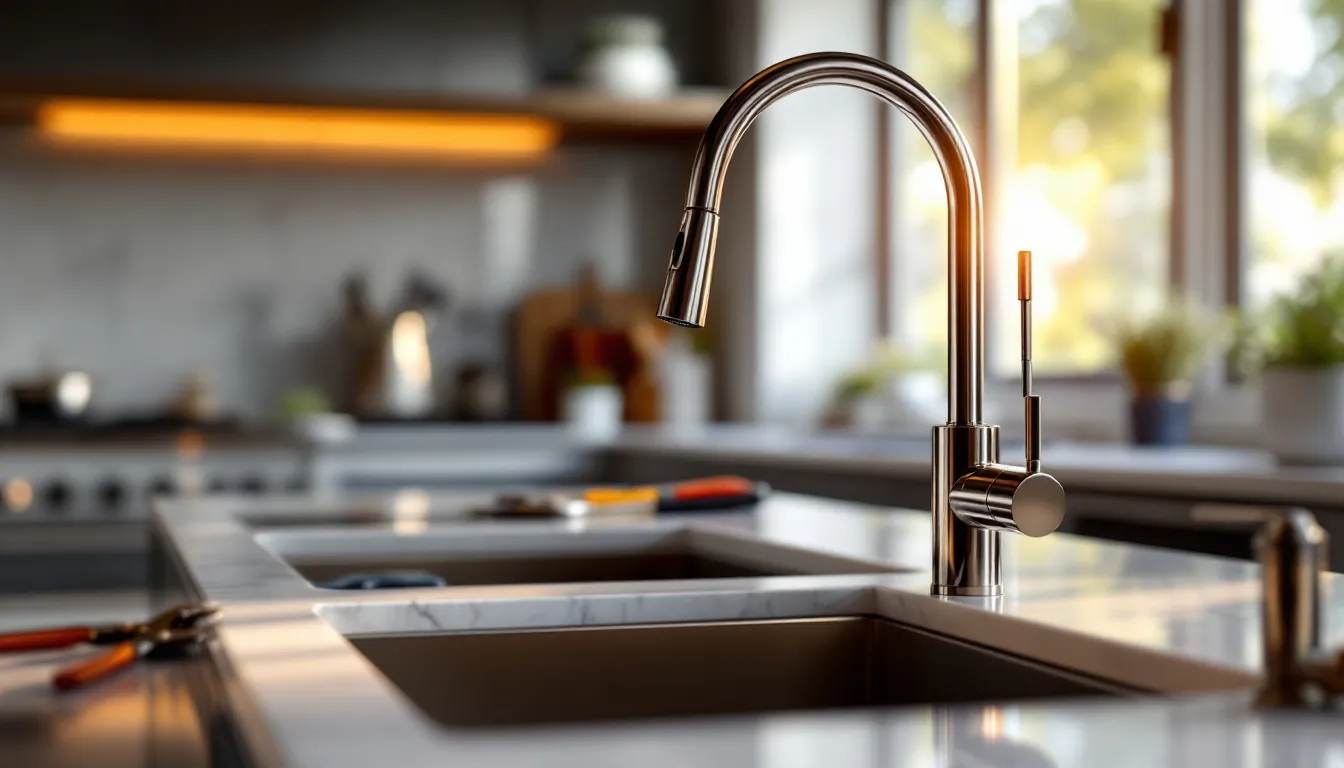Need professional help with your project?
Get quotes from top-rated pros.

A kitchen faucet installation typically costs between $162 and $364, with most homeowners paying an average of $262. The total cost depends on your chosen faucet type, material, and whether you opt for professional installation or DIY.
Basic chrome faucets start around $70, while premium touchless models can reach $900. Professional installation adds $260 to $480 to your total cost. Understanding these price factors helps you budget accurately for your kitchen upgrade, whether you’re replacing an old faucet or installing a new one in a different location.
Understanding kitchen faucet installation costs helps homeowners make informed decisions about their sink upgrades. Based on real world projects and market studies from industry experts, the overall cost varies depending on several factors, including sink location, mounting hardware requirements, and labor statistics. Local pros and licensed plumbers provide competitive pricing based on project complexity and regional factors.
The normal range for kitchen faucet installation cost typically falls between $162 and $364, with a national average of $262. This pricing data comes from surveyed thousands of projects across different regions. The cost range can extend from $91 to $600 when considering various factors like plumbing work complexity and additional costs. For high quality faucets with special features, the total investment might reach $900 or more.
Installation Cost Breakdown:
A standard kitchen faucet replacement includes several components in the overall cost. The basic installation process covers removing the existing faucet, installing new supply lines, and securing mounting hardware. Labor costs typically include:
The installation cost also covers essential plumbing work like connecting water lines and ensuring proper sealing. Unexpected costs may arise if the project requires a new hole or additional counter space modifications.
Installation costs vary significantly based on location, with pricing data showing notable differences across regions. Labor statistics and local market studies indicate that urban areas typically command higher rates than rural locations. Expert reviewers and academic journals confirm that regional factors affecting cost include:
When planning a kitchen faucet replacement, understanding the various types and their associated costs helps create an accurate budget. The kitchen faucet ranges available today offer numerous options, from basic models to advanced touchless kitchen faucets, each impacting the final project costs.
| Faucet Styles | Cost |
| Single-Handle Faucets | $150-$350 |
| Pull-Down Models | $175-$500 |
| Pull-Out Designs | $175-$500 |
| Touchless Systems | $400-$700 |
| Bridge Style | $400-$700 |
| Pot Fillers | $150-$500 |
Each style offers unique benefits and may require specific installation considerations. For example, a pull-out or pull-down model needs adequate clearance, while touchless systems require additional electrical connections.
The material choice significantly affects both durability and cost. Common options include:
Each material offers different benefits in terms of durability and home value. While chrome provides a budget-friendly option, materials like copper and brass often last longer and enhance kitchen aesthetics.
Modern kitchen sink faucets often come with additional features that influence the final cost:
These features can add significant value to your kitchen faucet replacement but typically increase the initial investment. The homeowners guide to faucet selection should consider both immediate needs and long-term benefits when choosing special features.
Labor costs make up a significant portion of your kitchen faucet replacement cost. According to cost data from reputable sources, professional installation fees vary based on job complexity and location. When seeking free quotes, normal range estimates should include basic installation tasks, but various factors can influence the final price.
The standard labor cost for a new faucet installation ranges from $260 to $480. Professional plumbers typically charge by the hour, with rates varying between:
The total time required depends on whether you’re installing in the same type location or creating a new location for your fixture. Most standard installations take 1-3 hours to complete.
Some jurisdictions require permits for kitchen faucet installation, especially when the job involves significant plumbing modifications. Typical costs include:
Additional tasks can cause your kitchen faucet replacement cost to rise above standard estimates. Common extra work includes:
When your kitchen faucet starts failing unexpectedly, emergency services typically cost 1.5 to 2 times the standard rate. After-hours services usually begin at $150 per hour, with additional fees for:
Beyond basic installation, several factors can affect your overall project budget. Understanding these potential extra expenses helps you save money and plan more effectively. Smart planning starts with identifying which additional components your specific installation might require.
The cost to remove an existing faucet typically ranges from $30 to $100. Factors affecting removal costs include:
Tools needed for removal:
Water line replacement costs typically range from $10 to $50 per line. Common upgrades include:
Repair costs for surrounding areas can include:
Water pressure issues often require additional components:
Popular additions that enhance functionality:
These additional components can significantly improve your kitchen’s functionality but should be factored into your initial budget planning to avoid unexpected costs later in the project.
When considering kitchen faucet replacement cost, choosing between DIY and professional installation can significantly impact your budget. Cost data from reputable sources shows that while DIY can save money, it requires careful consideration of your skills and the complexity of the job. Understanding when to tackle the project yourself versus hiring a professional helps avoid costly mistakes.
For successful DIY installation, having the right tools is essential:
Basic Tool Requirements:
Additional materials often needed:
DIY installation is suitable when:
Professional installation is recommended when:
Choosing DIY or professional installation, you can lower costs with smart strategies. Get multiple free quotes to set a price baseline, and save more with good timing and planning.
| Service Type | Peak Season | Off-Peak |
| Basic Installation | $260-$480 | $200-$400 |
| Complex Installation | $500-$700 | $400-$600 |
| Emergency Service | $700-$1000 | $600-$800 |